PitchBook Alternatives
Explore 10 alternatives to PitchBook. This guide compares each platform's data, features, and pricing to help you make an informed choice.

PitchBook is a popular tool for good reason. Many use it for its deep B2B database and sales intelligence features. The platform performs well when you need detailed data on private companies for market research or to identify sales triggers.
However, some users note its high price and occasional data gaps, which might lead you to look for alternatives. We analyzed the best options against PitchBook using G2 reviews to help you shortlist the top tools for a deeper review. Let's get started.
Explore 11x for Digital Sales Workers
If your team explores digital workers for sales tasks, consider 11x. The platform helps you build and deploy them to manage repetitive sales activities. This frees up your sales representatives to focus on deals.
11x is a GTM platform that uses AI agents to manage sales. Its agent Alice finds prospects, handles outreach, and updates the CRM. Julian qualifies inbound leads and books meetings. The platform replaces separate tools for data enrichment, outreach, and email warmup in one solution.
PitchBook Alternatives
Below, we review the top alternatives to PitchBook in detail. Each review covers pricing, core features, and its main advantages or potential drawbacks compared to PitchBook.
1) Crunchbase
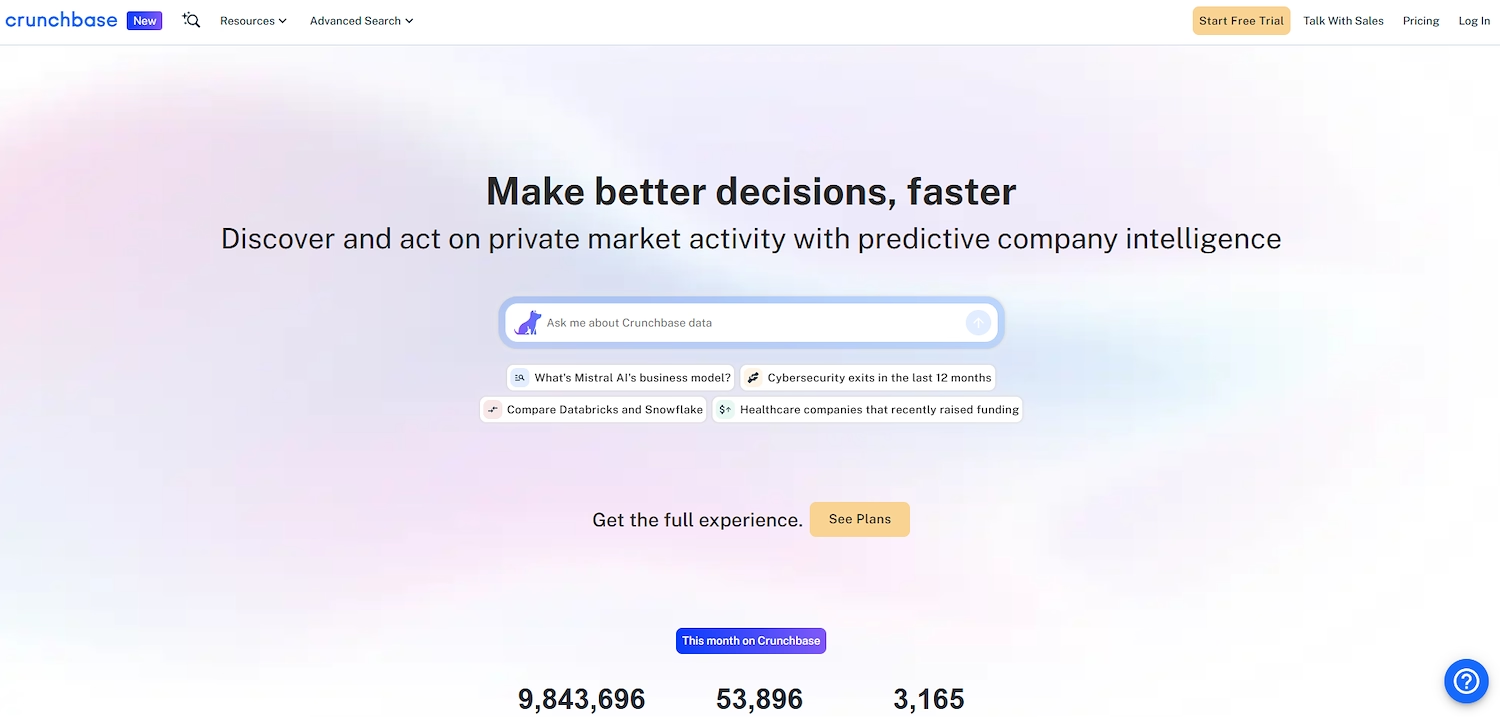
Crunchbase is a platform for private-company intelligence. You can use it to discover and track activity in global private markets. Its predictive analytics help spot companies that will likely seek funds soon or show other growth signals. Sales teams use this information to build prospect lists, while others can analyze business models or track sector momentum. The platform acts as a central hub for private market data.
Crunchbase's Main Features
- Offers algorithmic predictions on IPO likelihood, funding rounds, growth, and leadership hires.
- Provides an advanced search capability for filtering companies, people, investors, and rounds.
- Surfaces notable events across thousands of companies through continually updated insight cards.
- Includes an AI-driven research assistant, Crunchbase Scout, to help with research tasks.
Crunchbase vs. PitchBook: Key Differences
Average Review score: 4.5/5 stars based on 377 G2 reviews.
- Crunchbase offers a monthly subscription plan, which provides more flexibility compared to PitchBook's typical annual contracts.
- Its AI-powered predictive analytics help identify companies that are likely to seek funding, offering a different approach to prospecting.
- The platform's natural-language search is often considered more user-friendly for quick lookups than PitchBook's complex filters.
- It focuses on surfacing emerging startups and market trends, while PitchBook provides deeper data on private equity and venture capital deals.
Where Crunchbase Falls Short of PitchBook
- Crunchbase sometimes provides less granular data on private equity and venture capital deals. For example, it may not offer the same level of detail on fund performance metrics that PitchBook provides.
- Some users note that information on the platform can be outdated or incomplete. This may happen because it relies more on automated data collection, unlike PitchBook's large in-house research team that verifies data points.
- The tool's data coverage can be less comprehensive in markets outside of North America. In contrast, PitchBook often provides more extensive information on international companies and investors.
- It offers fewer advanced reporting and data visualization tools. PitchBook, on the other hand, provides more robust options for creating custom reports for in-depth due diligence.
Pricing and Cost-Effectiveness
Crunchbase offers a Pro plan for $588 per year, providing a more flexible entry point than PitchBook's typical annual contracts. This makes Crunchbase more cost-effective for individuals or small teams, while PitchBook is geared toward enterprise clients with larger budgets.
2) CB Insights
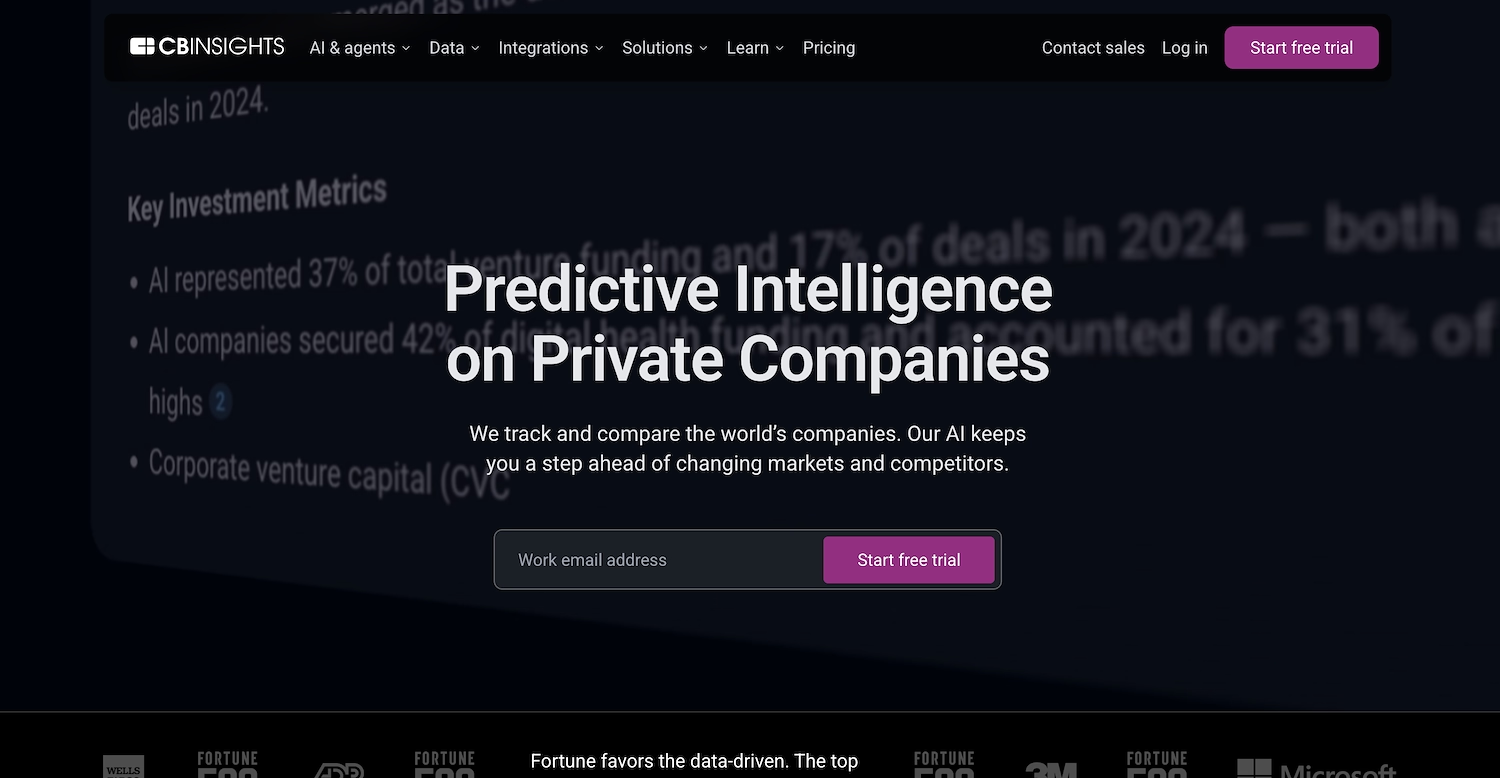
CB Insights is a market intelligence platform that uses AI for strategic decisions. It analyzes data on over 10 million companies across 1,500 markets. The platform provides insights on competitors, markets, M&A, and new technologies to help organizations make decisions with more confidence.
Users can monitor competitors, follow funding trends, and create partner or acquisition pipelines. The service uses verified private and public company data.
CB Insights's Main Features
- Answers strategic questions with a generative-AI assistant, ChatCBI, which uses proprietary data and automates tasks with its Magic Mode.
- Uses proprietary predictive metrics like the Mosaic Score and Exit Probability to benchmark company health.
- Provides instant company insights through a browser extension and offers on-the-go access with a mobile app.
- Integrates with tools like Salesforce and Microsoft 365 Copilot and provides data through a REST API and Snowflake Secure Data Share.
How CB Insights Compares to PitchBook
Average Review score: 4.3/5 stars based on 14 G2 reviews.
- CB Insights offers market maps that help users visualize emerging tech trends. This contrasts with PitchBook, which focuses more on granular data for individual companies and deals.
- The platform produces in-depth research reports that analyze tech disruption across industries. This provides a different perspective compared to PitchBook's reports, which often center on PE and VC deal activity.
- Its platform includes patent analysis, which helps users track innovation and technology trends. PitchBook's analysis, in comparison, centers more on company financials and funding rounds.
- Users receive daily insight emails that summarize important market news and trends. This provides a curated, regular update that differs from the deal-focused alerts typically found in PitchBook.
Where CB Insights Falls Short of PitchBook
- CB Insights sometimes has gaps in its contact data. PitchBook, in contrast, often provides more direct contact information for executives and investors, which can be useful for sales outreach.
- Some users find its user interface complex when they need to refine advanced searches. In comparison, PitchBook offers highly granular search filters that allow for very specific queries.
- The platform's customer support can sometimes be slower than its competitors. PitchBook often provides dedicated account managers for more immediate assistance as part of its enterprise service.
- It may offer less detailed financial information on private equity and venture capital deals. PitchBook, by contrast, specializes in granular data points like fund performance metrics for due diligence.
Pricing and Cost-Effectiveness
CB Insights does not publicly list its pricing, which is similar to PitchBook's enterprise-focused model. For the most accurate and up-to-date pricing information, we recommend visiting CB Insights's official website to request a quote.
3) Preqin Pro
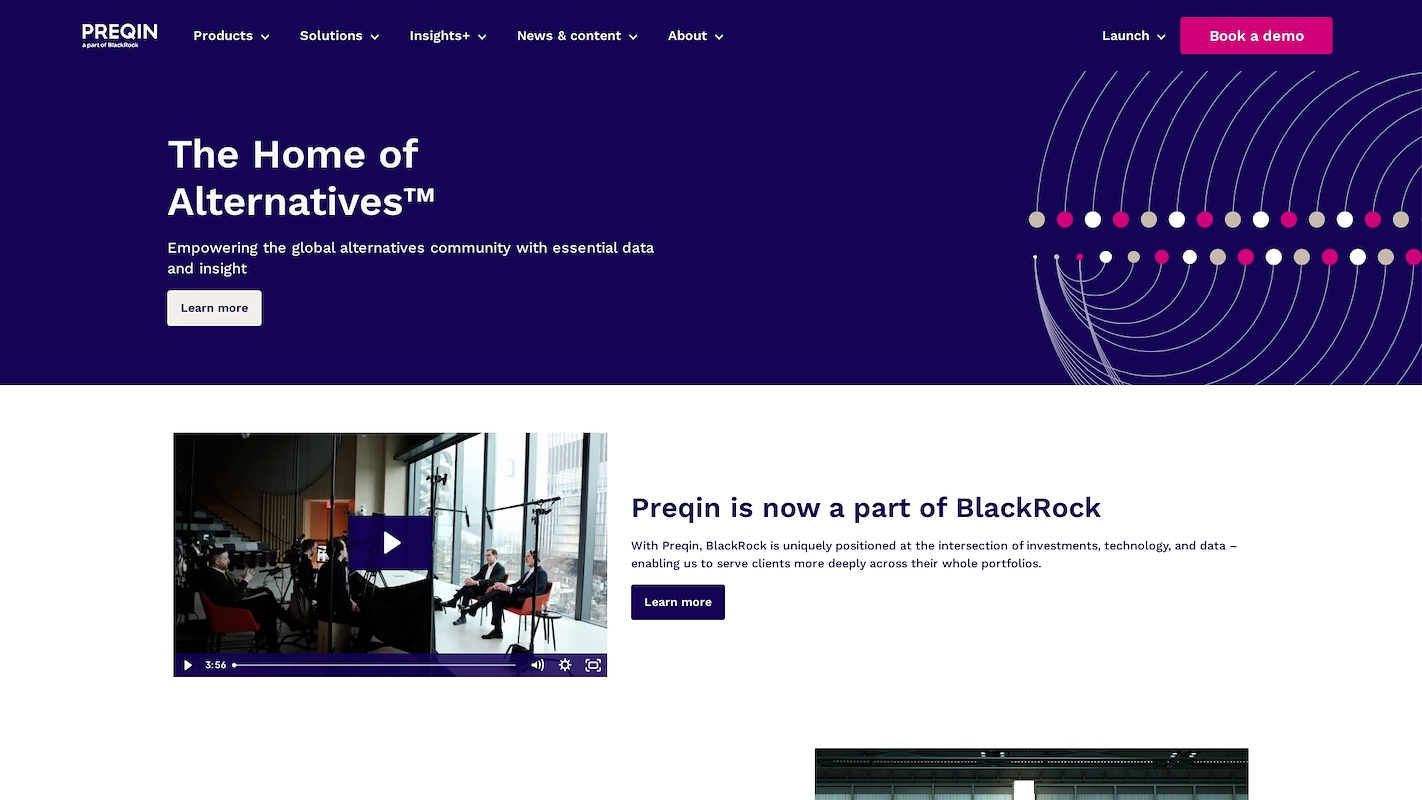
Preqin Pro is a data platform for alternative assets. It provides information on private equity, venture capital, and hedge funds. Teams use the service to find investors, screen for deals, and monitor fund performance. The database holds details on fund managers and service providers.
This information helps users identify opportunities and conduct due diligence in private markets. The data supports sales intelligence work and helps teams create prospect lists.
Preqin Pro's Main Features
- Provides data on alternative assets, including private equity, venture capital, and hedge funds.
- Offers tools to screen for deals, find investors, and monitor fund performance.
- Contains a database with details on fund managers and service providers to support due diligence.
How Preqin Pro Compares to PitchBook
Average Review score: 3.8/5 stars based on 2 G2 reviews.
- Preqin Pro offers dedicated ESG Solutions, allowing users to integrate environmental, social, and governance factors into their investment process. While PitchBook has ESG data, Preqin Pro's tools for this purpose are more specialized.
- The platform provides very detailed data on alternative assets like private capital and hedge funds. This focus offers more depth in these specific areas compared to PitchBook's broader market coverage.
- It includes tools that help with portfolio monitoring and valuation for direct investments. This feature supports general partners and limited partners with automated workflows for reporting.
- The tool contains a section with investor news and reports. These resources help users understand different industries, a slightly different approach from PitchBook's deal-focused reports.
Where Preqin Pro Falls Short of PitchBook
- Preqin Pro's contact data can be less reliable for prospecting, as some users report that emails sometimes bounce. PitchBook, in contrast, often includes more direct and verified contact information for outreach.
- Some users find the platform's interface less intuitive, noting that information can be hard to read. This presents a different user experience compared to PitchBook's interface, which is built for navigating dense datasets.
- The tool may leave data fields blank when information is unavailable, without providing context. PitchBook often differs by having its research team add notes or explanations for similar data gaps.
Pricing and Cost-Effectiveness
Preqin Pro follows a similar enterprise pricing model to PitchBook, as it does not publicly list its costs. For the most accurate and up-to-date pricing information, we recommend visiting Preqin Pro's official website.
4) PrivCo
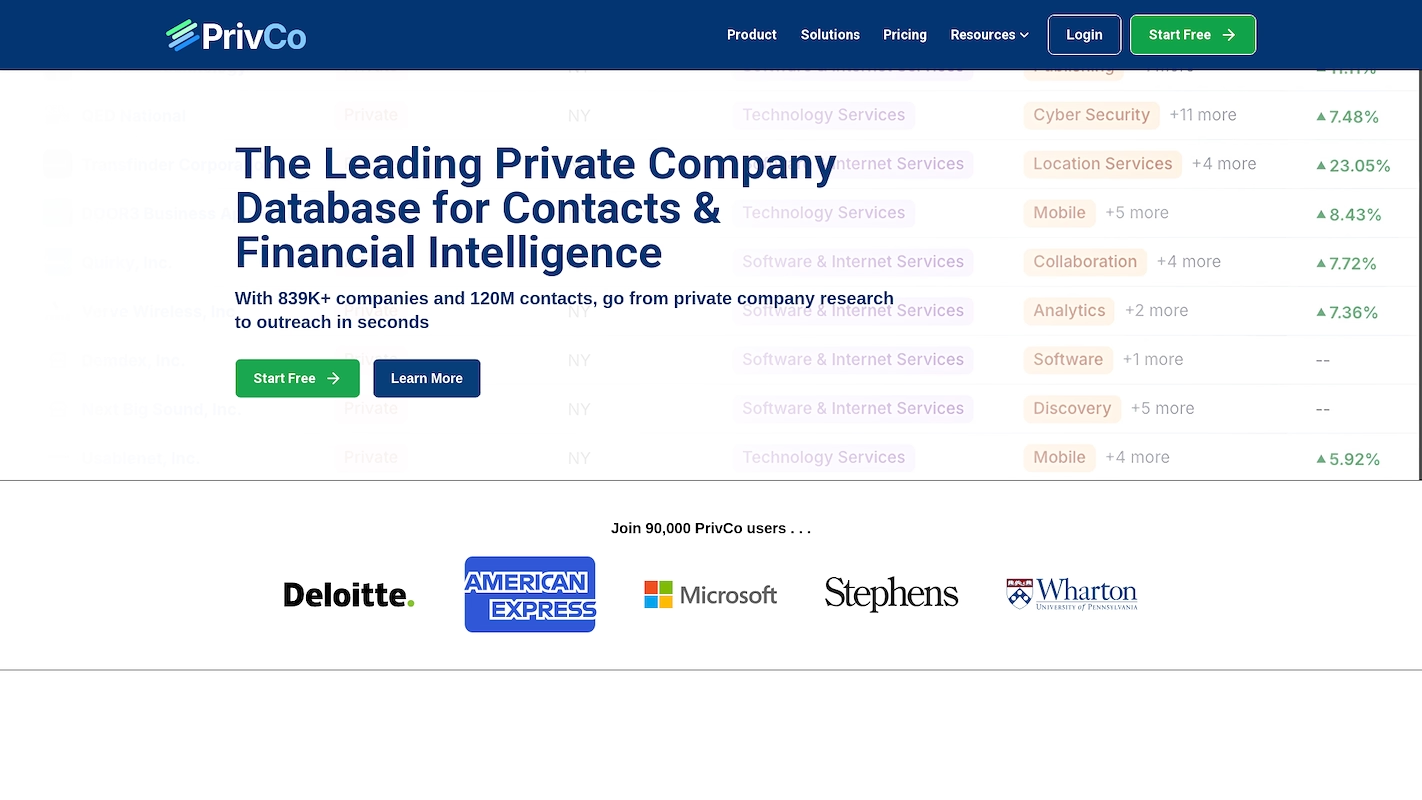
PrivCo is a platform with a B2B database focused on private company financials. Sales teams use its data to uncover sales triggers and gain intelligence on prospects. The service details company revenues, funding, and ownership, which helps users build targeted lists and understand the private market.
PrivCo's Main Features
- Provides data on over 893,000 private companies and 120 million contacts, with an emphasis on bootstrapped firms.
- Offers current and historical financial data, including revenue, EBITDA, valuations, and ownership details.
- Includes advanced search filters to query companies by ownership, funding, geography, industry, and growth metrics.
- Uses proprietary algorithms and machine learning for large-scale data analysis and keyword tagging.
How PrivCo Compares to PitchBook
Average Review score: 4.0/5 stars based on 1 G2 review.
- PrivCo offers a monthly subscription plan, which provides more flexibility compared to PitchBook’s typical annual contracts.
- The platform focuses on bootstrapped and other "truly private" companies, while PitchBook centers more on venture-backed businesses and deal flow.
- It provides detailed financial data like revenue for private firms, whereas PitchBook's data is more oriented toward funding rounds and valuations.
- The tool's deep coverage of the U.S. market is an advantage for users targeting domestic companies, compared to PitchBook's broader international scope.
Where PrivCo Falls Short of PitchBook
- PrivCo's data coverage focuses primarily on the U.S. market. In comparison, PitchBook offers more extensive information on international companies and investors, which is a key difference for global research.
- The platform provides fewer advanced reporting and data visualization tools. PitchBook, by contrast, includes more robust options to create custom reports for in-depth due diligence and analysis.
- Some users note its focus is more on company financials than on granular deal data. PitchBook specializes in detailed information on private equity and venture capital deals, including specific fund performance metrics.
Pricing and Cost-Effectiveness
PrivCo offers a Select plan starting at $149 per month and a Plus plan for $1,299 per year. This provides a more accessible entry point than PitchBook, which focuses on annual, enterprise-level contracts. As a result, PrivCo is a more cost-effective option for individuals or smaller teams.
5) S&P Capital IQ Platform
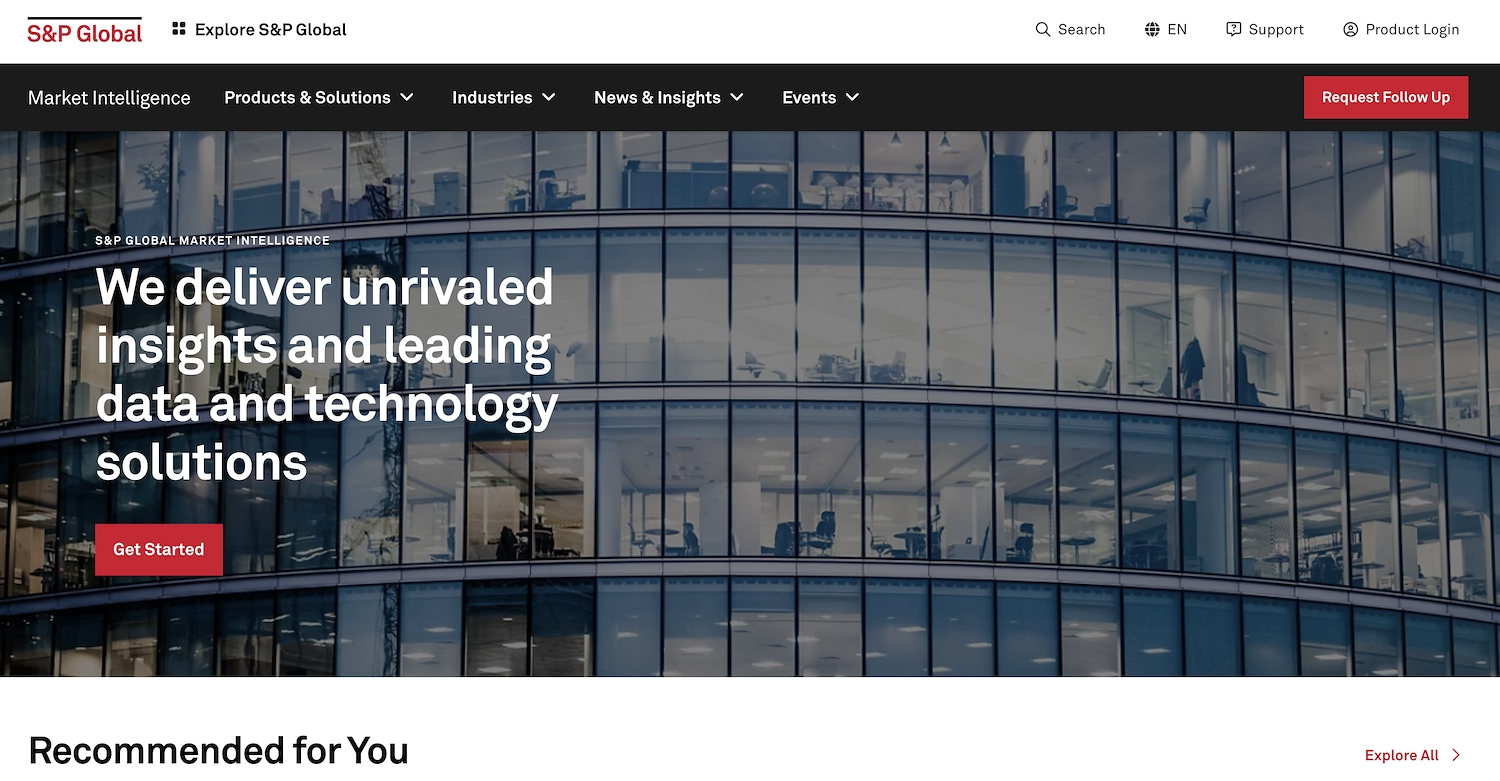
S&P Capital IQ Platform is a data and analytics service for financial markets. It provides information on public and private companies, markets, and key personnel. Sales teams use the platform to find sales triggers and build prospect lists based on detailed company data.
The service also supports corporate development and private equity professionals. They use it for market analysis and due diligence on potential deals and investments.
S&P Capital IQ Platform's Main Features
- Offers data and analytics covering public and private companies, financial markets, and key personnel.
- Includes tools to identify sales triggers and build prospect lists from detailed company data.
- Supports market analysis and due diligence for corporate development and private equity professionals.
How S&P Capital IQ Compares to PitchBook
Average Review score: 4.3/5 stars based on 36 G2 reviews.
- S&P Capital IQ offers deep financial data on public companies, including detailed statements. This contrasts with PitchBook's primary focus on private company deal flow and funding rounds.
- The platform includes advanced tools for financial analysis and charting. This allows for more complex modeling than PitchBook, whose tools focus on screening and list building.
- It provides extensive data on public markets, which complements its private market information. PitchBook, in contrast, concentrates almost exclusively on the private capital ecosystem.
- A powerful document search feature lets users find information within filings and transcripts. This offers a different research method from PitchBook's profile-based data structure.
Where S&P Capital IQ Falls Short of PitchBook
- Some users find the S&P Capital IQ Platform's interface complex, which may require more time to learn. PitchBook's design, in contrast, is often more direct for tasks like prospect list creation.
- The platform's focus on both public and private markets can mean its private company data is less detailed. PitchBook, on the other hand, specializes in the private market ecosystem and often provides more granular deal information.
- It may offer less comprehensive coverage of early-stage startups and emerging technology trends. PitchBook often provides more specialized data in this area, a benefit for venture capital and innovation scouts.
Pricing and Cost-Effectiveness
S&P Capital IQ Platform does not publicly list its pricing, following an enterprise model similar to PitchBook. For the most accurate pricing, we recommend visiting the S&P Capital IQ Platform's official website to request a quote.
Build a Digital Sales Team With 11x
For teams that want to use AI agents for sales, 11x offers a platform to build and manage them. You can automate tasks like prospecting and outreach. This lets your sales reps concentrate on high-value activities. See if 11x fits your GTM strategy.
With 11x, our AI agents manage your sales process. Alice finds accounts, enriches their data, and handles outreach. Julian takes calls, qualifies prospects, and schedules meetings. We combine tools for intent signals and email warmup into one platform, removing the need for extra tools.
Book a demo to see 11x in action.
6) Refinitiv Eikon
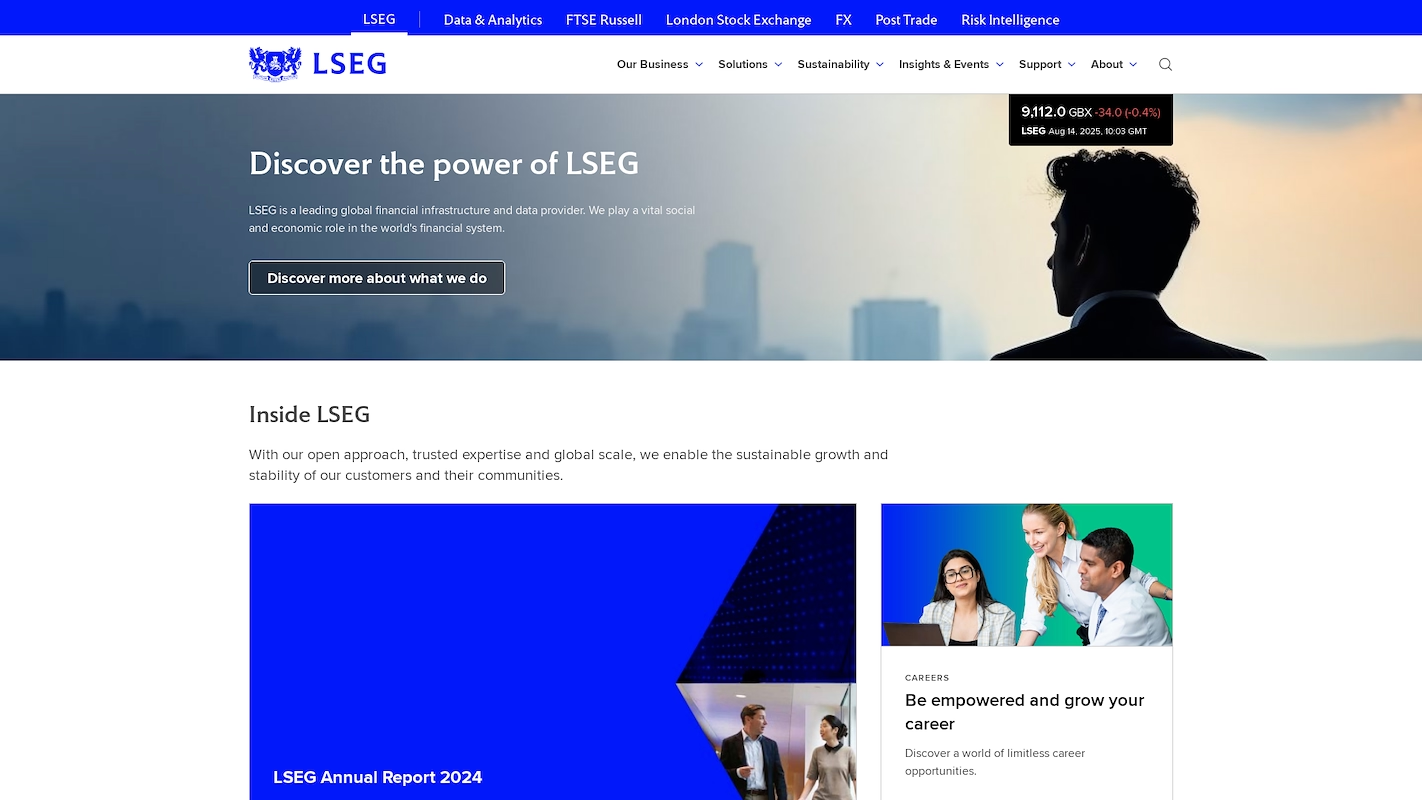
Refinitiv Eikon is a platform with financial analysis data. It delivers information on markets like foreign exchange, equities, and commodities. The service gives access to data, news, and analytics so users can research companies and industries.
This information helps teams that need market insights or specific business details. Sales professionals use the data for intelligence work and to build prospect lists.
Refinitiv Eikon's Main Features
- Delivers data on markets such as foreign exchange, equities, and commodities.
- Provides access to financial data and analytics.
- Offers news feeds to research companies and industries.
How Refinitiv Eikon Compares to PitchBook
Average Review score: 4.1/5 stars based on 50 G2 reviews.
- Refinitiv Eikon provides real-time market data and exclusive Reuters news. This offers a broader view of financial markets compared to PitchBook's focus on private company deal data.
- The platform is open and connects with various APIs and apps for custom workflows. This provides more flexibility than PitchBook's more closed data environment.
- It includes a directory of over 300,000 verified financial professionals for networking. This feature is different from PitchBook, which focuses more on providing contact lists for outreach.
- The tool integrates with an Execution Management System (EMS) for pre-trade analysis. This supports traders directly, a function not available in PitchBook, which is designed for research and prospecting.
Where Refinitiv Eikon Falls Short of PitchBook
- Refinitiv Eikon's private company data can sometimes be less detailed. PitchBook, in contrast, specializes in granular information on funding rounds, valuations, and private equity deals as its core focus.
- Some users say the platform has a steep learning curve that requires training. This differs from PitchBook, whose interface is often considered more direct for building prospect lists and screening for deals.
- The tool might present difficulties when users try to export large datasets. PitchBook, on the other hand, has features specifically designed to build and export lists for analysis or outreach.
- Its focus on public financial markets means it may offer less comprehensive coverage of early-stage startups. PitchBook often provides more specialized data in this area, a benefit for venture capital and innovation scouts.
Pricing and Cost-Effectiveness
Refinitiv Eikon follows an enterprise pricing model similar to PitchBook and does not publicly list its costs. For the most accurate pricing, we recommend visiting Refinitiv Eikon's official website to request a quote.
7) FactSet
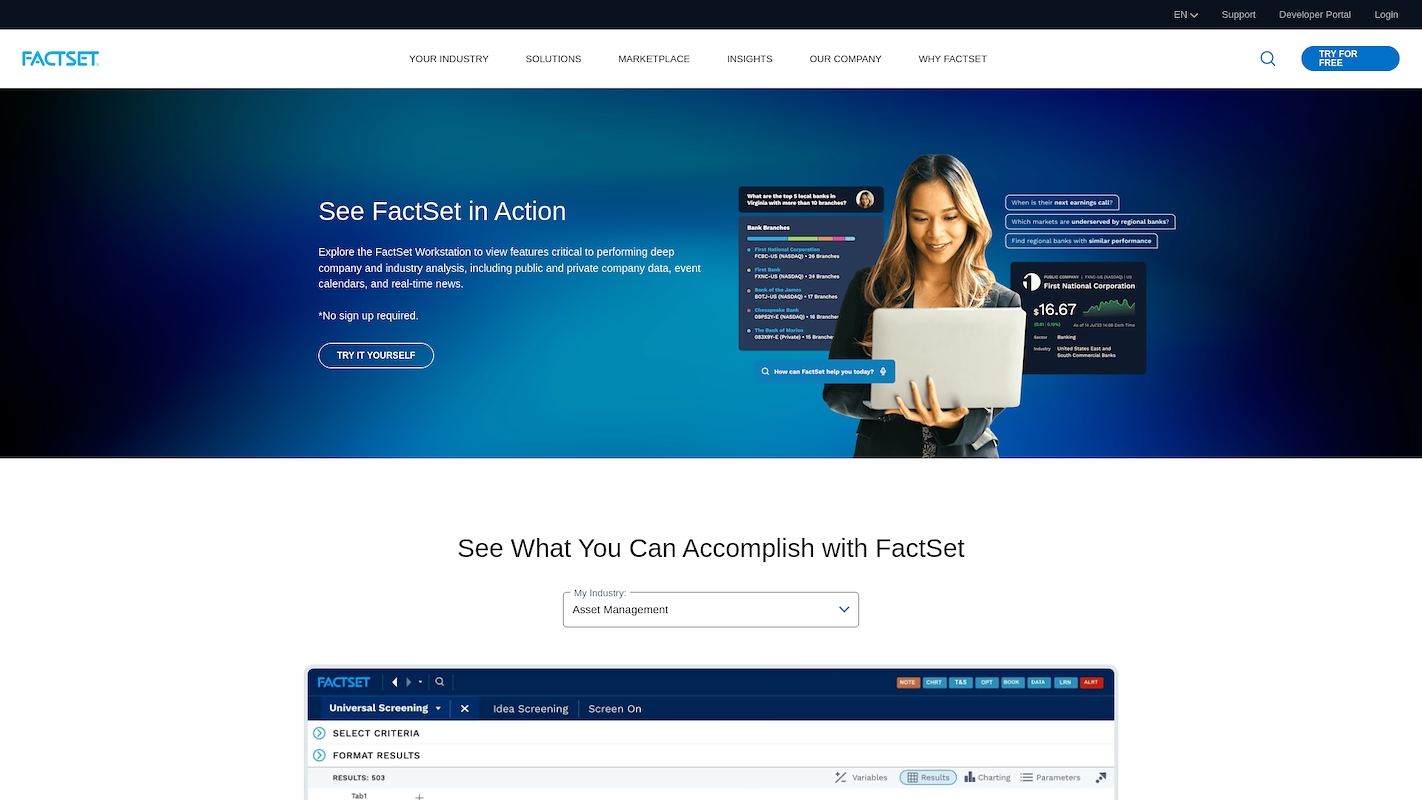
FactSet is a financial data and analytics platform with a B2B database for sales intelligence. It provides data on public and private companies for market analysis. Corporate development and private equity professionals also use the service to find opportunities and support their workflows.
FactSet's Main Features
- Offers a financial data and analytics platform that includes a B2B database for sales intelligence.
- Supplies data on both public and private companies to support market analysis.
- Provides tools for corporate development and private equity professionals to identify opportunities and support workflows.
How FactSet Compares to PitchBook
Average Review score: 4.3/5 stars based on 34 G2 reviews.
- FactSet provides data on both public and private markets from over 800 sources. This differs from PitchBook, which concentrates primarily on the private capital ecosystem.
- The platform offers significant flexibility for building custom reports and templates. This provides a different level of personalization compared to PitchBook's more structured reporting tools.
- Its Excel add-in is noted for being user-friendly and includes an audit function. This can offer a smoother workflow for financial modeling than exporting data from PitchBook.
- The tool includes AI-powered features like smart search to simplify research. This presents a different approach to data discovery than PitchBook's manual, filter-based search system.
Where FactSet Falls Short of PitchBook
- Some users find the FactSet interface complex, which can require more training. PitchBook, in contrast, provides a more direct workflow to build prospect lists, which simplifies research for sales teams.
- FactSet's private company data is sometimes less detailed on early-stage startups. PitchBook specializes in the private market ecosystem and often gives more granular information on funding rounds and deal terms.
- The platform aggregates data from many sources, which can sometimes result in outdated information. In comparison, PitchBook uses a large research team to manually verify data, which can improve its reliability for due diligence.
Pricing and Cost-Effectiveness
FactSet follows an enterprise pricing model similar to PitchBook and does not publicly list its costs. For the most accurate pricing, we recommend visiting FactSet's official website to request a quote.
8) Tracxn
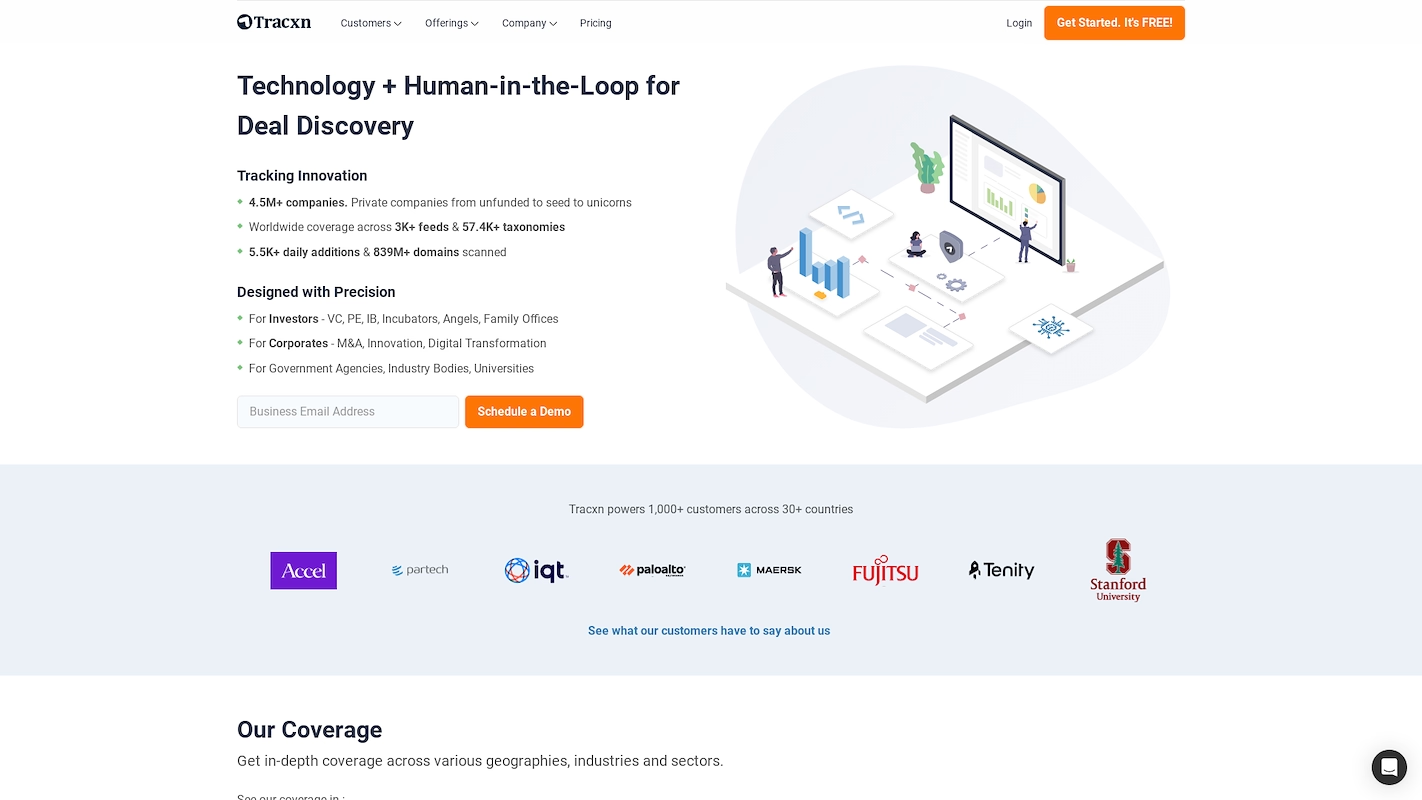
Tracxn is a market intelligence platform that tracks private companies. Sales teams use the service for sales intelligence to find prospects and identify sales triggers, such as funding announcements.
The platform acts as a B2B database to help build targeted lead lists, with a focus on companies in emerging sectors.
Tracxn's Main Features
- Tracks over 3.7 million companies using more than 2,900 feeds across 100+ countries.
- Offers in-depth tracking of funding rounds, company news, and emerging themes across industries.
- Uses a team of over 150 analysts to curate company profiles and sector reports.
- Categorizes companies across a detailed taxonomy of industries, sectors, and sub-sectors.
How Tracxn Compares to PitchBook
Average Review score: 4.2/5 stars based on 14 G2 reviews.
- Tracxn uses a detailed taxonomy to categorize companies across many industries and sub-sectors. This allows for more specific searches than PitchBook's broader classification system.
- The platform offers extensive coverage of emerging sectors and markets across more than 100 countries. This provides a different focus compared to PitchBook, which often centers on more established markets.
- It provides better cost performance according to some users, which can make it a more accessible option. This contrasts with PitchBook's enterprise-level pricing and annual contracts.
- A team of over 150 analysts curates sector reports and company profiles. This offers a different type of analysis from PitchBook's data-focused profiles, which are verified by its own research team.
Where Tracxn Falls Short of PitchBook
- Some users note that Tracxn's automated data collection can lead to errors. PitchBook differs by using a large research team for manual data verification, which may improve data reliability.
- Its research reports can sometimes feel mechanical and lack detailed insights. PitchBook, by contrast, often provides more in-depth analysis, especially on private equity and venture capital deal structures.
- The platform sometimes has less comprehensive data for specific areas like U.S. M&A. In comparison, PitchBook provides more extensive information on mergers and acquisitions, a feature often used for corporate development research.
Pricing and Cost-Effectiveness
Some users report Tracxn offers better cost performance, which may make it a more accessible option than PitchBook’s enterprise-level annual contracts. Tracxn does not list its pricing publicly, so for the most accurate information, we recommend visiting Tracxn's official website.
9) Dealroom.co
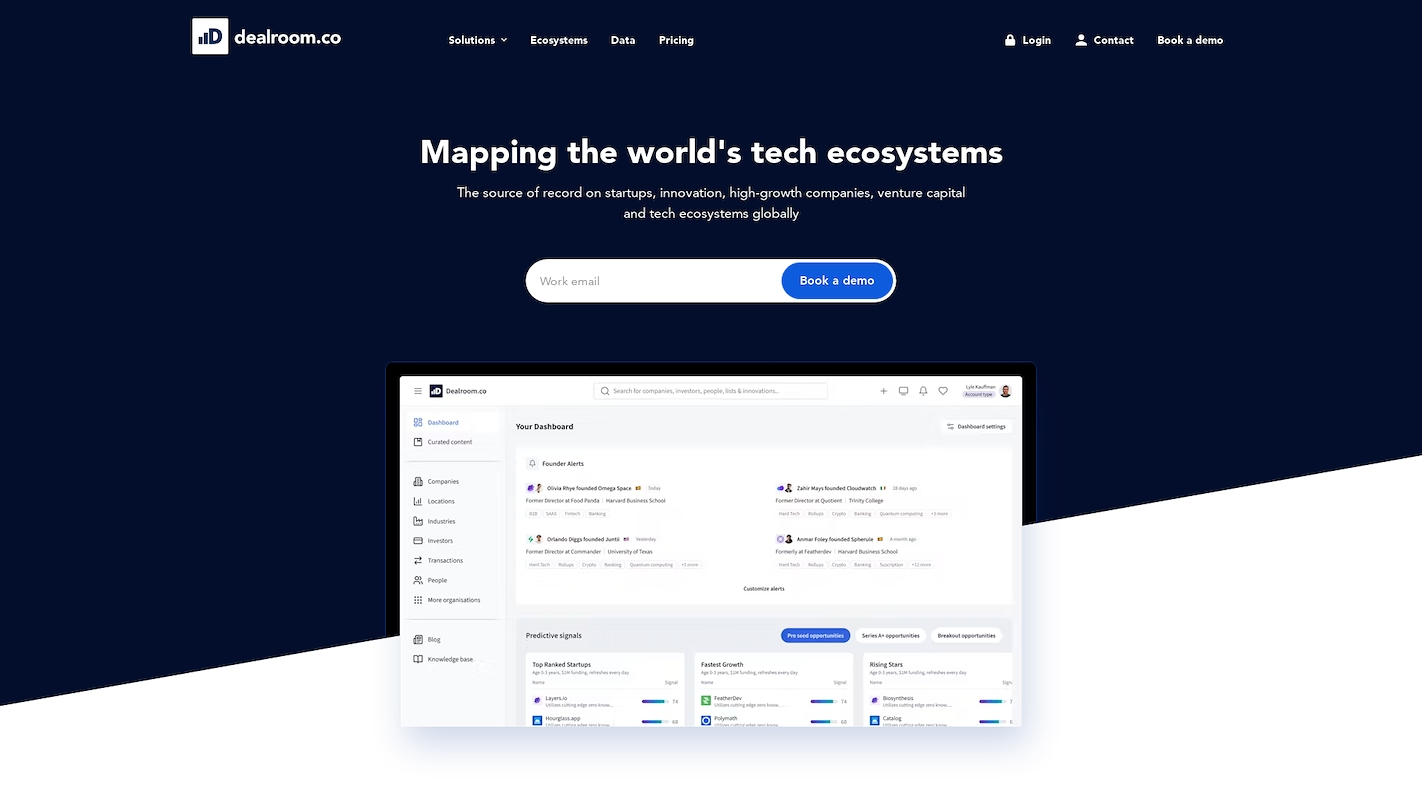
Dealroom.co is a data and intelligence platform with a focus on startups and technology companies. It provides a B2B database that sales teams use to find sales triggers and market signals. The service helps users build prospect lists and gather intelligence for sales outreach.
Dealroom.co's Main Features
- Provides interoperability for integrating data into custom applications and workflows.
- Includes mobility features for accessing data and analytics on the go.
- Offers risk analysis tools to evaluate investment opportunities and market conditions.
- Delivers alerts and monitoring on market news to track companies and industries.
How Dealroom.co Compares to PitchBook
Average Review score: 4.7/5 stars based on 23 G2 reviews.
- Dealroom.co is an API-first platform, which allows for deeper data integration into custom workflows. This offers more flexibility compared to PitchBook's more closed data system.
- The platform provides intelligence on entire tech ecosystems, not just individual companies. This approach differs from PitchBook, which centers its data around specific deals and company profiles.
- It includes specific risk analysis tools to help evaluate investment opportunities. This provides a more focused function for due diligence than the general market data found in PitchBook.
- The tool offers dedicated mobility features for accessing data and analytics on the go. This contrasts with PitchBook, which is primarily designed for desktop-based research.
Where Dealroom.co Falls Short of PitchBook
- Dealroom.co may offer less granular data on private equity and venture capital deals. PitchBook, in contrast, often provides more detailed information on fund performance and specific deal terms for due diligence.
- The platform's data on smaller or niche companies can sometimes be incomplete. This is different from PitchBook, which uses a large in-house research team to manually verify data points for accuracy.
- Some users report the tool can have slower performance, especially with complex queries. PitchBook's interface, in comparison, is often optimized for quickly building and exporting large prospect lists for outreach.
Pricing and Cost-Effectiveness
Dealroom.co follows an enterprise pricing model similar to PitchBook and does not publicly list its costs. For the most accurate pricing, we recommend visiting Dealroom.co's official website to request a quote.
10) Bloomberg Terminal
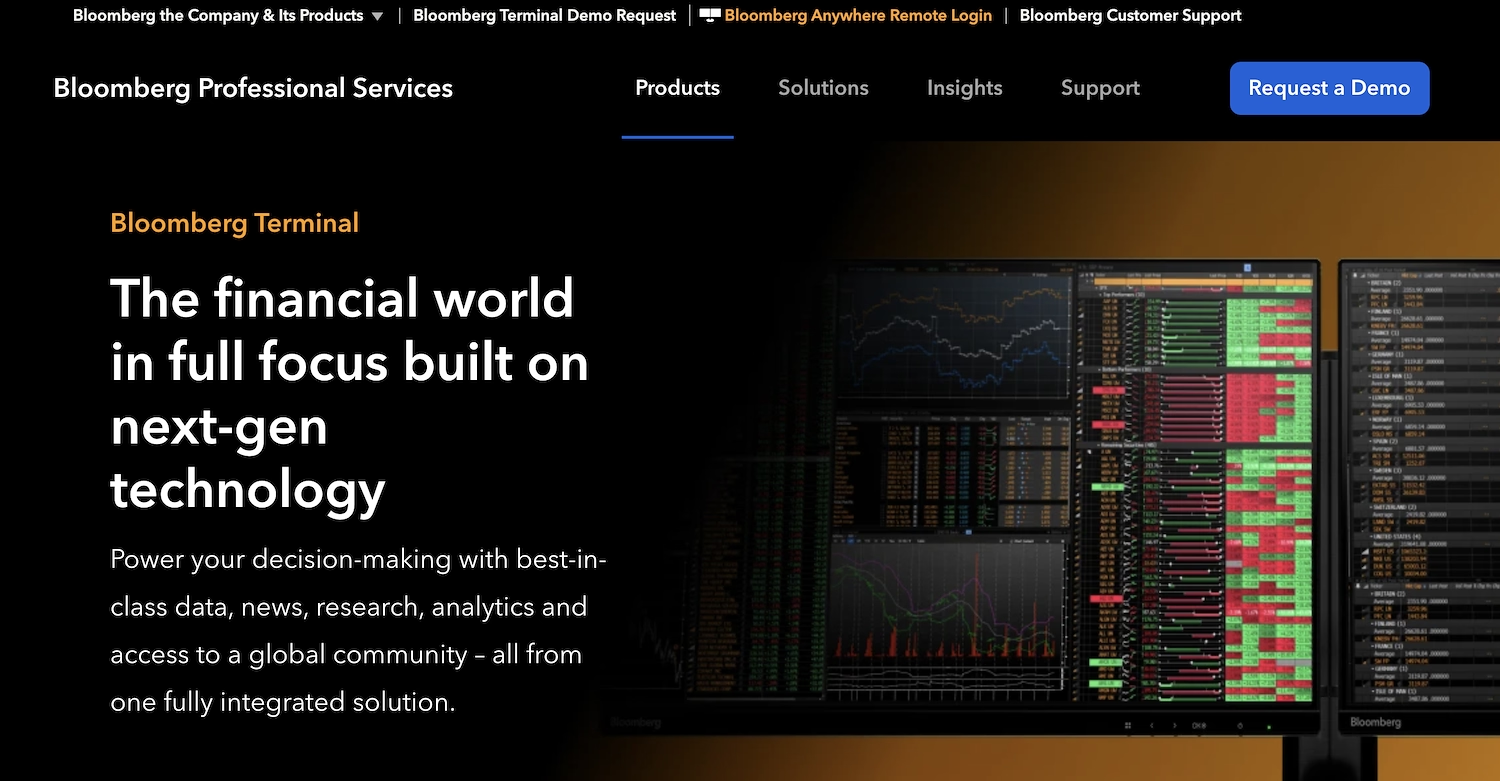
The Bloomberg Terminal is a software system that provides financial market data, news, and analytics. It connects users to a network of information, people, and ideas, with data on public and private companies, markets, and supply chains.
Sales teams use the platform to find business opportunities and gather intelligence on prospects. The service helps users understand market dynamics and build prospect lists.
Bloomberg Terminal's Main Features
- Provides financial information, market news, and data with alerts and monitoring.
- Offers tools for financial analysis, data visualization, and charting.
- Includes risk analysis to evaluate opportunities and market conditions.
How Bloomberg Terminal Compares to PitchBook
Average Review score: 4.3/5 stars based on 67 G2 reviews.
- Bloomberg Terminal offers real-time financial market data and news, which provides a more immediate view of market movements compared to PitchBook's focus on historical private deal data.
- It provides deep data on both public and private companies, offering a broader market perspective than PitchBook, which concentrates mainly on the private capital ecosystem.
- The platform includes advanced financial analysis and charting tools for complex modeling. This differs from PitchBook, whose tools primarily support company screening and the creation of prospect lists.
- The tool provides detailed supply chain data, allowing users to analyze company relationships and dependencies. This is a feature not typically found in PitchBook's company profiles.
- It features an integrated messaging system that connects financial professionals directly. This creates a network for communication, unlike PitchBook, which serves as a research and data platform.
Where Bloomberg Terminal Falls Short of PitchBook
- The platform's private company data can sometimes be less detailed. In contrast, PitchBook specializes in the private market and provides more granular information that its research team verifies.
- Some users find the Bloomberg Terminal interface complex and note a steep learning curve. PitchBook's platform, by comparison, offers a more direct workflow for sales teams who build prospect lists.
- The tool's broad focus on public markets means its features for private market prospecting are less specialized. PitchBook, on the other hand, centers its platform on the private capital ecosystem with tools built for deal sourcing.
- The Bloomberg Terminal is known for its very high cost, which often exceeds PitchBook's enterprise pricing. This makes it less accessible for teams that need only private market intelligence.
Pricing and Cost-Effectiveness
The Bloomberg Terminal is known for its very high cost, which often exceeds PitchBook's enterprise pricing. For the most accurate pricing, we recommend visiting the Bloomberg Terminal's official website to request a quote.
Which PitchBook Alternative Should You Choose?
Choosing the right PitchBook alternative depends on your team's specific needs, budget, and focus areas. This guide reviewed several top options to help you compare their features and find the best fit for your organization.
If your goal is to automate sales tasks, 11x offers a different approach. Its AI agents manage prospecting and outreach, allowing your sales team to focus on closing deals instead of manual data work.




